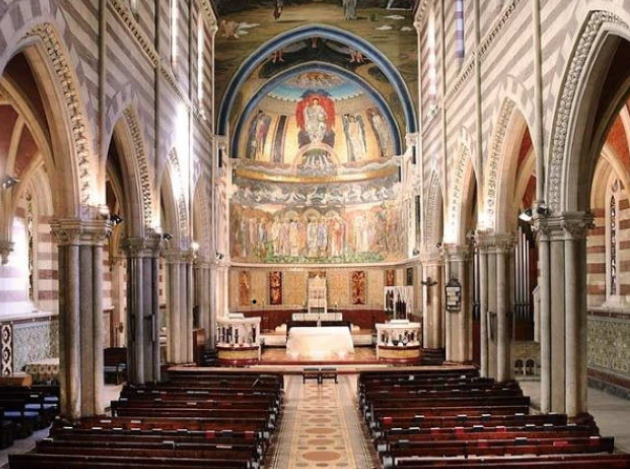
The American Episcopal (Anglican) Church is the first non-Catholic place of worship built in Rome after the unification of Italy and the end of the temporal power of the Church when freedom of religion within the city walls was finally enshrined. On a design by architect George Edmund Street and commissioned by Reverend Robert J. Nevin - head of the religious congregation in Rome and a passionate art collector - the construction of Saint Paul within the Walls, along the new Via Nazionale, thus started - unique evidence in Italy of the English ‘Arts and Crafts’ movement - which aimed to reform the arts, revaluing craftsmanship against industrial production - and one of the most interesting sacred art creations in late 19th-century Rome. The foundation stone was laid on 25 January 1873, the Feast of the Conversion of St Paul.
A particular play of colours between the red of the brick strips and white of the travertine characterises the church's exterior and the bell tower with its mullioned windows, realised in a mixed Romanesque-Gothic style. Around the rose window and the portal are splendid mosaics; made in the early 20th century, they depict the four evangelists and Saint Paul among Roman soldiers and are the work of the American artist George Breck.
The interior, divided into three naves, displays a refined decorative apparatus - to which the greatest representatives of English art of the time contributed - illuminated by coloured stained glass windows with stories from the life of St Paul made expressly by the English firm Clayton & Bell and embellished by majolica tiles attributed to William Morris. The mosaics in the apse and choir are the work of the Pre-Raphaelite Edward Burne Jones, who designed the cartoons and commissioned a Murano company to make the mosaic tiles. Such is their artistic value that the Italian government declared them a national monument. Curiously, some saints and fathers of the Church have the features of contemporary historical figures: St Andrew has the face of Abraham Lincoln, St James that of Giuseppe Garibaldi and St Patrick the one of General Ulysses S. Grant, one of the protagonists of the American War of Secession.
Information
For the timetable of the masses and visiting conditions, please consult the contacts
 Condividi
Condividi
Locations
To find out about all accessibility services, visit the Rome accessible section.












































